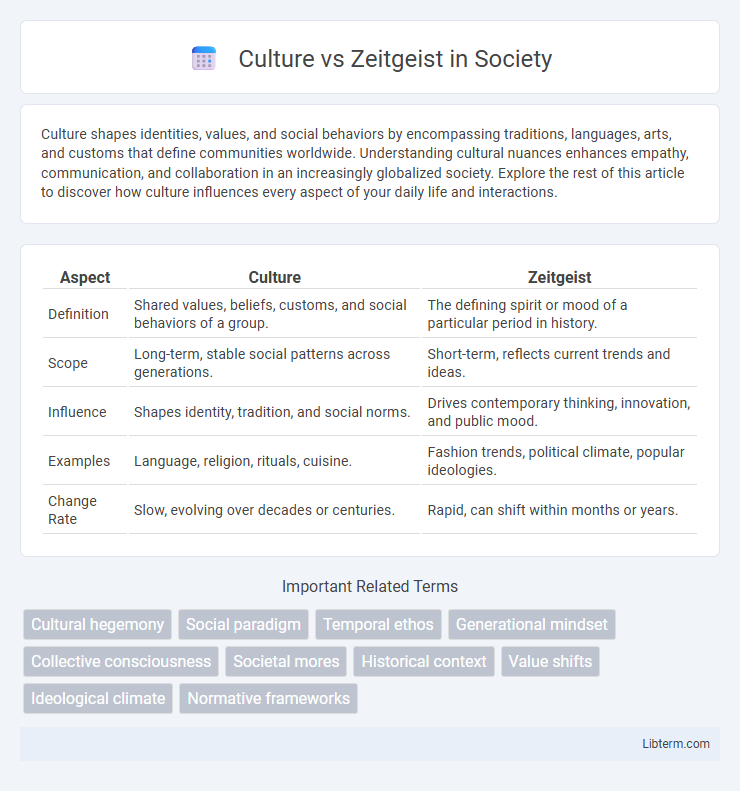Culture shapes identities, values, and social behaviors by encompassing traditions, languages, arts, and customs that define communities worldwide. Understanding cultural nuances enhances empathy, communication, and collaboration in an increasingly globalized society. Explore the rest of this article to discover how culture influences every aspect of your daily life and interactions.
Table of Comparison
| Aspect | Culture | Zeitgeist |
|---|---|---|
| Definition | Shared values, beliefs, customs, and social behaviors of a group. | The defining spirit or mood of a particular period in history. |
| Scope | Long-term, stable social patterns across generations. | Short-term, reflects current trends and ideas. |
| Influence | Shapes identity, tradition, and social norms. | Drives contemporary thinking, innovation, and public mood. |
| Examples | Language, religion, rituals, cuisine. | Fashion trends, political climate, popular ideologies. |
| Change Rate | Slow, evolving over decades or centuries. | Rapid, can shift within months or years. |
Defining Culture and Zeitgeist
Culture encompasses the collective beliefs, customs, arts, and social behaviors of a particular group or society, shaping identity and continuity over time. Zeitgeist refers to the dominant set of ideas, attitudes, and spirit characteristic of a specific period in history, influencing societal trends and movements. Understanding the distinction between culture and zeitgeist is crucial for analyzing how enduring traditions interact with transient historical moods.
Historical Evolution of Cultural Norms
The historical evolution of cultural norms reflects the gradual transformation of societal values, beliefs, and practices shaped by successive generations, environmental changes, and technological advancements. Cultural norms emerge from long-standing traditions and collective experiences, whereas the zeitgeist captures the prevailing attitudes and ideas specific to a particular historical period. This dynamic interplay drives shifts in social behavior, influencing how communities adapt to modern challenges while preserving core identities.
The Influence of Zeitgeist on Society
Zeitgeist, the defining spirit or mood of a particular period, profoundly shapes societal values, behaviors, and technological advancements by reflecting prevailing attitudes and collective consciousness. This influence manifests in art, politics, and social norms, driving cultural evolution and influencing individual identity formation within the community. Historical examples include the enlightenment zeitgeist fostering democratic principles and the digital age zeitgeist accelerating globalization and information exchange.
Culture as a Foundation of Identity
Culture serves as the foundational framework shaping individual and collective identity through shared values, customs, and traditions. It provides a stable sense of belonging and continuity over time, anchoring personal and social narratives despite the fluctuating nature of zeitgeist. By embedding historical experiences and collective memory, culture fosters resilience and coherence within communities against transient trends.
Zeitgeist: Shaping Modern Perspectives
Zeitgeist, the defining spirit of an era, profoundly shapes modern perspectives by influencing societal values, beliefs, and innovations that emerge within a specific time frame. This collective consciousness drives cultural evolution, technological advancement, and shifts in public opinion, reflecting the dynamic interplay between historical context and contemporary thought. Understanding zeitgeist is crucial for analyzing how current trends and ideologies are formed and how they, in turn, shape future cultural landscapes.
Key Differences Between Culture and Zeitgeist
Culture encompasses the shared values, beliefs, customs, and traditions of a specific group or society, reflecting long-term social patterns and collective identity. Zeitgeist represents the prevailing spirit, ideas, and attitudes specific to a particular historical period, often shaping trends and social movements in the short term. While culture provides a stable framework of meaning across generations, zeitgeist captures the transient, dynamic forces influencing societal behavior during specific moments in time.
Intersections: When Culture Meets Zeitgeist
Culture embodies the shared values, traditions, and practices that define a society over time, while zeitgeist captures the prevailing spirit or mood of a specific historical moment. The intersection of culture and zeitgeist reveals how enduring cultural narratives adapt to or resist contemporary social, technological, and political changes. This dynamic interplay shapes societal identity by blending historical continuity with immediate, transformative influences reflecting current collective consciousness.
Case Studies: Shifts in Culture vs Zeitgeist
Case studies reveal that shifts in culture often stem from deep-rooted societal changes, while zeitgeist reflects immediate, prevailing attitudes and trends; for instance, the cultural revolution of the 1960s reshaped values enduringly, whereas the zeitgeist of the digital age prioritizes innovation and connectivity. Analysis of the post-9/11 era shows a zeitgeist marked by heightened security concerns that influenced short-term policy and social behavior, contrasting with cultural shifts toward global interconnectedness developing more gradually over decades. These examples underscore that culture shifts provide a stable foundation for social norms, whereas zeitgeist captures fluctuating public sentiments in response to contemporary events.
The Role of Media in Reflecting and Shaping Zeitgeist
Media serves as a critical conduit for disseminating and interpreting the prevailing zeitgeist, capturing and amplifying societal values, beliefs, and trends that define an era. By selectively framing narratives and highlighting specific issues, media outlets influence public perception and contribute to shaping cultural norms and collective consciousness. The dynamic interplay between media representations and audience reception continuously evolves the zeitgeist, reflecting shifts in technology, politics, and social movements.
Future Trends: Navigating Culture and Zeitgeist
Future trends reveal that culture shapes societal values while zeitgeist captures the prevailing spirit influencing behaviors and innovations. Navigating culture and zeitgeist requires understanding how cultural heritage intersects with emerging technological and social shifts. Businesses and creators who align strategies with both enduring cultural norms and dynamic zeitgeist elements can anticipate market needs and drive sustainable growth.
Culture Infographic

 libterm.com
libterm.com